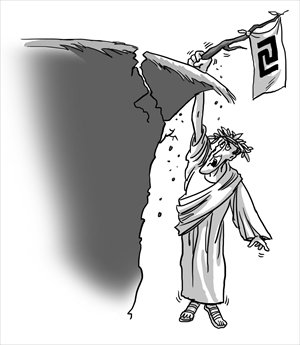Grim times mean bonanza for Greek's far right as Golden Dawn shines

A relatively new phenomenon in Greece is the rise of the extreme right, mainly represented by the neo-Nazi Golden Dawn party.
Although this party has been around for some time, its performance in elections before the outbreak of the crisis had been rather poor. In an election on October 4, 2009, it only gathered 0.29 percent of the vote.
In just two and a half years, however, Golden Dawn managed not only to become elected, but also to show remarkable political success, wining about 7 percent of the vote in elections now. And recently support has risen once more to as high as 12 percent.
The rise of the far right in Greece can be considered collateral damage of the ongoing economic crisis.
Many people have linked this evolution to the problem of migration. According to one survey, 75 percent of Greeks attribute the rise of criminality to foreigners whom they consider as damaging the national identity and civilization of the country.
In parallel with this, data presented by the Minister of Public Order and Justice in the Hellenic Parliament demonstrates that perpetrators in robberies are disproportionately foreigners.
But this alone cannot satisfactorily explain the remarkable success of Golden Dawn.
If the antipathy toward foreigners had been a catalytic factor in domestic politics, it would have boosted the electoral image of Golden Dawn in previous elections. But this did not happen.
The Hellenic Republic did not experience the challenge of illegal immigration for the first time in 2012.
The narration of the success story of Golden Dawn should include a reference to the fall of another Greek right wing, albeit less radical, party called LAOS (Popular Orthodox Alarm). LAOS won parliament seats in October 2009, gathering 5.63 percent of the vote.
Two years later in November 2011, after the resignation of the then socialist prime minister George Papandreou, LAOS decided to support the new unity government under the leadership of technocrat Lucas Papademos.
This political gesture associated the party with the so-called Memorandum and the policy of austerity dictated by Greece's creditors. It also alienated LAOS from its anti-bailout supporters who started to seek for political alternatives for the election which would take place a few months later.
The rise of the far right, however, should be principally attributed to the willingness of citizens to support extreme parties in a time of crisis.
Lessons from history and especially from developments in the 1930s suggest that economic depression leads citizens to endorse political extremism at the expense of status-quo politicians.
Conditions are rather similar nowadays in Greece. Unemployment soars, poverty is on the rise, recession deepens and people have lost hope for the future.
Some of them do feel a base need to frustrate traditional politicians, who are responsible for the crisis, by voting for a party which certainly challenges their authority. The main motivation is rather to find a platform to punish them than to approve or embrace neo-fascist principles.
In parallel with this, Golden Dawn is successful because its political rhetoric is synthesized around ethnocentrism.
Taking into account that the current crisis has been often framed in the domestic media discourse and the internal political debate as an attempt by foreign powers, mainly Germany, to economically dominate and occupy the country, it is not a surprise that nationalist voices are gradually gaining ground.
Golden Dawn, which uses the slogan "Greece belongs to Greeks," also benefits from the collapse in trust among EU citizens. According to a recent Eurobarometer poll, 79 percent of Greeks have lost their confidence in Europe.
Looking toward the future, Golden Dawn's support will not evaporate overnight. Although the Greek stock market has risen and the spreads of the 10-year sovereign bonds are drastically going down in recent weeks, much more is needed for the country to return to normalcy.
Conditions for the middle class are continuously deteriorating, because Greece is only adjusting through poverty and via structural changes. People who are suffering by austerity and calamity will not turn their back on the Golden Dawn.
The author is a research fellow at the Hellenic Foundation for European and Foreign Policy. opinion@globaltimes.com.cn